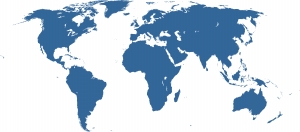
Financial advisors and their clients would be wise to keep an eye on the directions of the U.S. dollar and oil prices in 2016 as they will have a critical impact on multiple economies and some central banks’ decisions, according to the investment outlook produced by BlackRock Investment Institute, a part of New York-based BlackRock Inc.
“Further gains in the dollar would intensify pressure on commodity prices, emerging-markets currencies and U.S. profits by making its exports less competitive,” states the report released on Wednesday. “Falling oil prices have dragged down long-term inflation expectations and could encourage some central banks to step harder on the monetary accelerator.”
The outlook has some mixed results for the U.S. Although a stronger dollar would put pressure on some U.S. profits, the possibility that the U.S. Federal Reserve Board will soon raise its interest rate would benefit certain sectors.
“Banks and insurers have been positively correlated with rising yields,” says Russ Koesterich, a global chief investment strategist with the BlackRock Investment Institute, in a statement. “Our other preferences include technology, builders and prime U.S. commercial real estate.”
The report sees boosts to Japanese and European stocks thanks to the monetary conditions of those countries.
Japan has been actively pushing money into its economy through its quantitative easing program over the past few years. The continuation of that program as well as increased government spending in 2016 would bode well for corporate earnings in that country.
“Importantly, [corporate Japan] is showing a newfound appreciation for shareholder rights, with dividend payouts and share buybacks on the rise,” says Ewen Cameron Watt, a global chief investment strategist with the BlackRock Investment Institute, in the statement. “Since 2008, return on equity has been rising steadily.”
The BlackRock Institute report states that Europe is in a “slow-motion recovery,” with equities valuations for that region looking attractive in 2016 thanks to a weak euro, subdued wage growth and expanding domestic credit. However, it also notes that core inflation remains stubbornly low and the region’s improving export situation is under threat from a slowdown in emerging markets.
The report anticipates a “soft landing” for China, where a move toward market pricing and cutting manufacturing overcapacity is meant to stimulate the struggling economy’s gross domestic product.
An improved economic situation for China would help many economies, including those of emerging markets.
“Nowhere do China’s economic shifts reverberate more than in the emerging world, as the emerging market and trade booms have relied heavily on Chinese demand,” says Cameron Watt. “Emerging-market countries reliant on Chinese demand and commodities exporters, such as Australia, now face a double whammy, in that China’s growth has fallen further and faster than expected and the composition of the growth is changing fast, from demand for natural resources to an appetite for consumer goods, services and dairy products.”
However, emerging markets equity markets could be helped by higher global growth, significant depreciation in many EM currencies, easing inflation in some countries and the oil price collapse, which is a boon for oil-importing nations, the report finds.
Although the BlackRock Institute report sees muted growth for equities, it states there will be little or no price appreciation in fixed-income even though certain high-yield, investment-grade and hard-currency emerging-market debt looks attractive relative to government bonds.